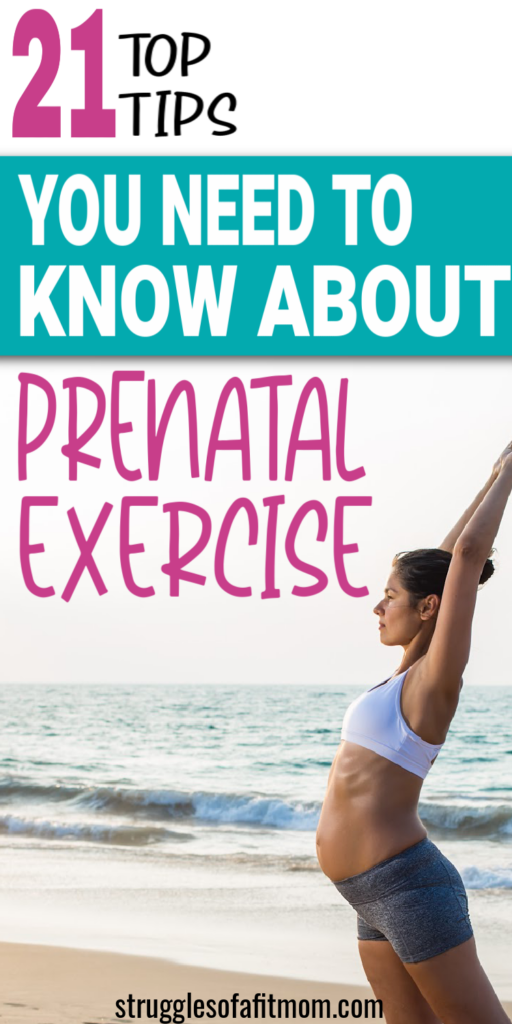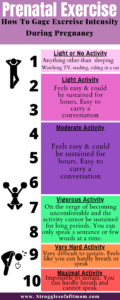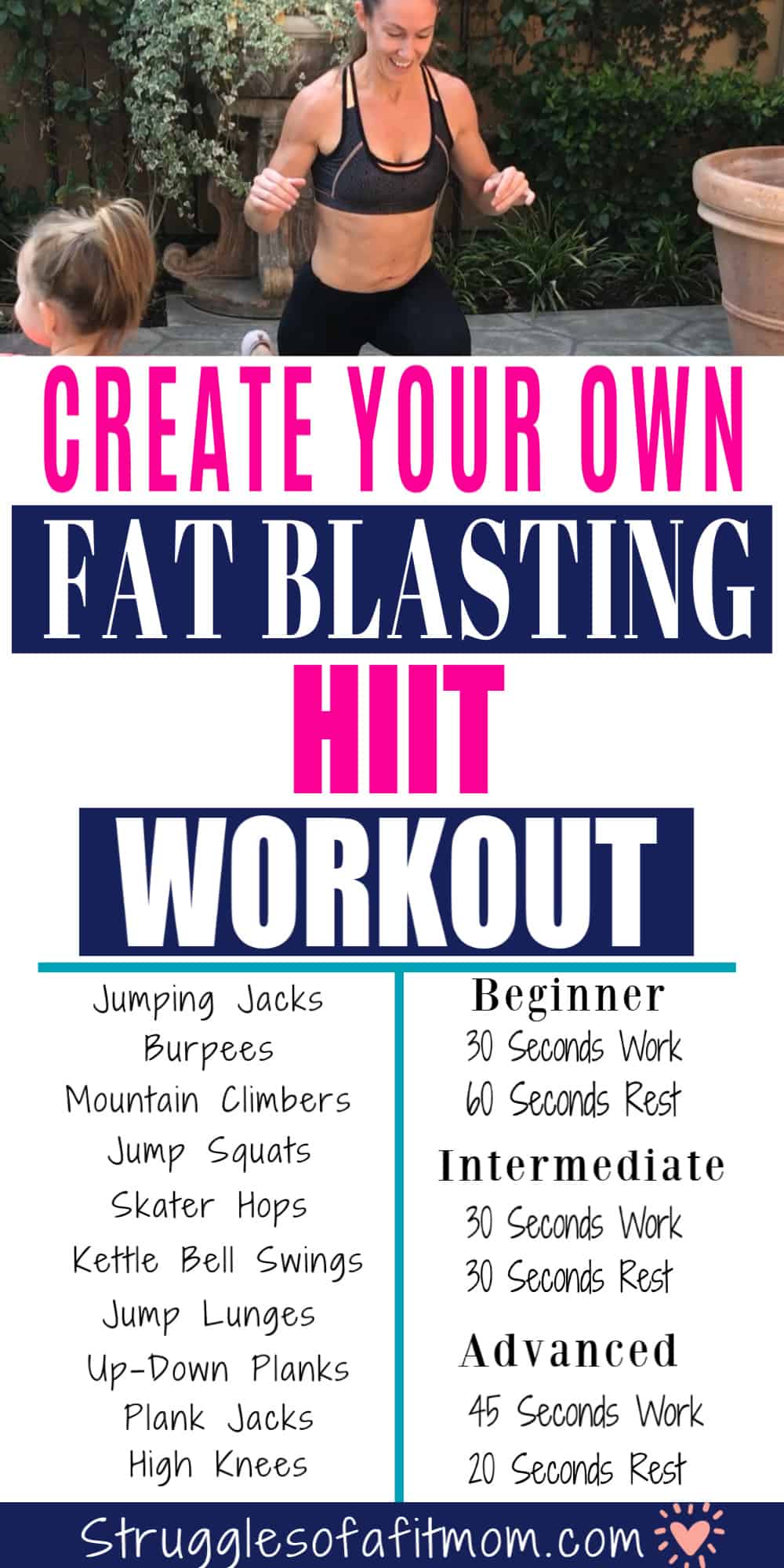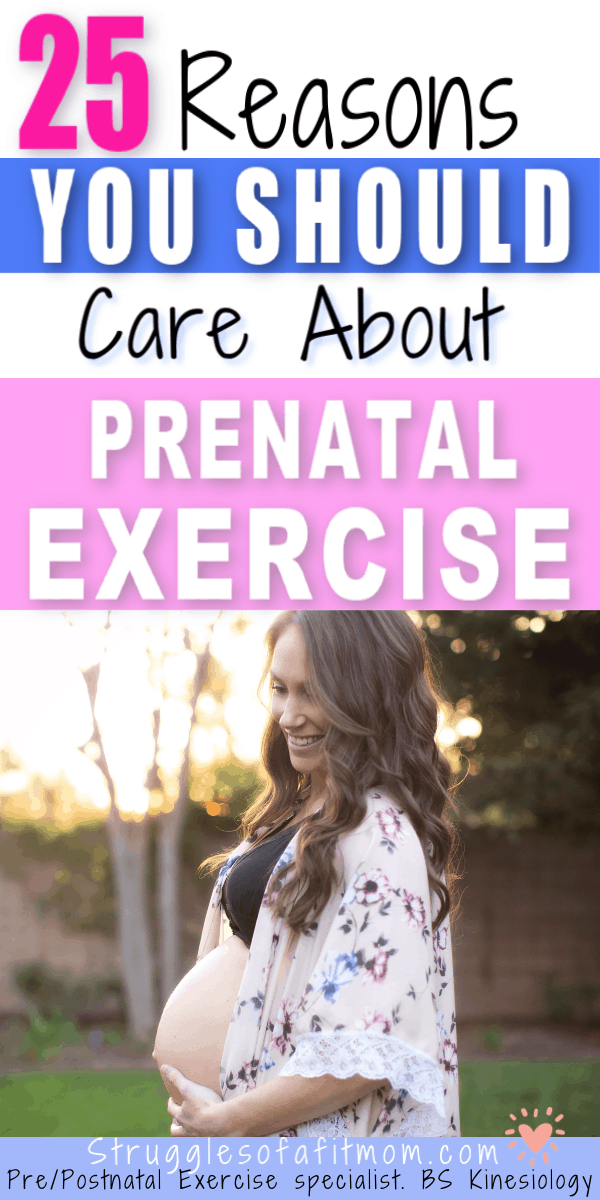20 Expert Tips To Stay Fit During Pregnancy
You have probably heard that prenatal exercise is important but now you’re probably wondering exactly how to stay fit during pregnancy, right?
In this post I share the top 20 most frequently asked questions I get about staying fit and healthy during pregnancy.
During my first pregnancy, I found myself incredibly confused by all the conflicting information I read regarding exercising during pregnancy.
Things I read online were much different from what my doctor had told me.
After much discussion with my doctor, I finally realized that much of the information available online about prenatal fitness is based on research from 20 plus years ago which is no longer supported by current research.
I will say that it is important to take what you read online with a grain of salt.
Which is ironic because you are reading this online right now.
However, as a mom of three, I know first-hand how scary and confusing pregnancy can be and my hope is to help you feel more relaxed during pregnancy through my knowledge and experiences.
Disclaimer: I am not a physician. Although I am a certified prenatal/postnatal exercise specialist and personal trainer, I am not YOUR trainer. The content on this blog is for informational purposes only and should not be a substitute of the information and advice you receive from a healthcare professional.
1. Is Exercise During Pregnancy Safe?
Not only is exercise safe during pregnancy, it is strongly encouraged!
The benefits extend beyond just you, it’s great for your baby too!
This is straight from The American College of Obstetricians and Gynecologists:
“In the absence of obstetric or medical complications or contraindications, physical activity in pregnancy is safe and desirable, and pregnant women should be encouraged to continue or to initiate safe physical activities
An exercise program that leads to an eventual goal of moderate-intensity exercise for at least 20–30 minutes per day on most or all days of the week should be developed with the patient and adjusted as medically indicated.
Women with uncomplicated pregnancies should be encouraged to engage in physical activities before, during, and after pregnancy.”
As always, consult with your doctor prior to starting an exercise routine during pregnancy. However, if you doctor gives you the okay, exercise is strongly encouraged during pregnancy.
2. What Is the Recommended Weight Gain During Pregnancy?
The average pregnancy weight gain is about 25-35 pounds.
However, there are several other factors that come into play with pregnancy weight gain such as your prepregnancy weight.
You can find the answers to all your pregnancy weight gain questions here!
Related: Everything You Need To Know About Weight Gain During Pregnancy
3. Can Exercise During Pregnancy Make Labor Faster?
Maybe!
While there are many variables in how long your labor will be, there is no doubt that maintaining as much muscle mass and cardiovascular fitness as possible will help you better cope with demands of labor and delivery.
According to The American Academy of Pediatrics, some studies have shown that mothers who exercise during pregnancy may have shorter labors, fewer medical interventions and less exhaustion during labor.
I like to think of exercising during pregnancy as preparing for the longest marathon of your life.
Staying active and specifically focusing on strengthening your core and pelvic floor muscles can definitely help you prepare for the big day.
If you are looking for more information on what to expect during labor, this is a phenomenal course that can help you be more prepared.
I took it during my third pregnancy and only wish I had this information during my first two!
4. How Can I Control My Weight Gain During Pregnancy?
Weight gain during pregnancy is not linear and will vary from mother to mother. However, maintaining a healthy weight gain is one of the most important things you can do to stay fit and healthy during pregnancy.
The best ways to control weight gain during pregnancy is to avoid processed foods, eat a variety of fruits and vegetables, drink plenty of water, and with your doctors approval, participate in a prenatal exercise routine.
Rememeber, what you feed your body during pregnancy, you feed your baby. To provide the best nutrients possible, make sure you are filling up on foods that provide nutrients and not just calories.
This pregnancy cookbook is by far the best list of recipes for pregnant mamas and I highly recommend it. It was created by a labor and delivery nurse who really knows her stuff!
5. What Is The Best Way To Manage Food Cravings?
Managing food cravings during pregnancy can be tough.
The combination of food cravings and food aversions makes finding healthy options a little challenging.
I suggest avoiding processed foods and added sugars because these tend to be highly addictive foods which can make food cravings harder to control.
Instead, choose foods that contain healthy fats and proteins to help keep you feeling full and make sure to drink plenty of water.
My best piece of advice is to remember that what you feed your body, you feed your baby!
Make sure at least 80% of your diet is full of nutrient dense foods to help your baby’s growth and development.
6. Why Do I Feel So Tired All The Time?
Pregnancy exhaustion is a huge struggle!
Especially in the first trimester and late in the third trimester. This is because your body is going through tremendous changes.
During the first trimester, your body is building a life-support system for your baby. It is producing more blood to carry nutrients to your growing baby. Your blood sugars and blood pressure may also be lower.
During the third trimester, the exhaustion comes from carrying extra weight from the baby and increased body fluids. It also becomes much harder to sleep during your third trimester due to your growing baby bump.
I highly suggest getting a pregnancy body pillow to help you get more comfortable and restful sleep.
I loved this one because it supported me on both sides of my body.
My three year old now uses it in her “big girl bed” to keep her from rolling out of the bed!
If at any point in pregnancy you feel fatigue is severe, be sure to talk to your healthcare provider.
7. Can I Lay On My Back During Pregnancy?
The reason it is recommended that you avoid lying on your back for extended periods of time during pregnancy is because the weight of the uterus can compress the major blood vessel that carries blood from the lower body back to the heart.
This can leave you feeling nauseated, dizzy and short of breath.
However, the average pregnant mother can lay on their backs for short periods of time, keeping it no longer than 5-10 minutes at a time. Your body will tell you when its time to get up. (Source)
I suggest avoiding exercising on your back after the first trimester however there is still plenty you can do to train your core!
If you are a back sleeper, using a pregnancy body pillow at night can really help you get more comfortable sleeping on your side.
The biggest key is to listen to your body.
8. How Can I Relieve Aches and Pains During Pregnancy?
The discomfort that accompanies pregnancy can feel unbearable at times.
My third pregnancy was especially challenging. Here are a few things that helped me through the process.
- Stay active. Especially focus on core and pelvic floor exercises
- Stretch
- Get a pregnancy body pillow
- Support your bump
- Wear comfortable shoes
- Relax when you can
Related: Relieve Pregnancy Back Pain With These 15 Exercises
Related: 14 Unique Stretches for a More Comfortable Pregnancy
9. Do I Need to Wear a Maternity Support Belt?
One of the best things you can do for a fit and healthy pregnancy is train your core!
A strong core will not only help relieve back pain from the extra weight of the growing baby but it will also help during labor.
I suggest wearing a maternity support band if you are experiencing round ligament pain, low back pain or know you have abdominal separation.
I have been through my fair share of maternity support bands during my three pregnancies.
During my second and third trimester, I loved this one because it was stretchy, not bulky and could easily be adjusted for desired support.
Yes, I know it is not specifically designed for pregnancy but it was very comfortable.
10. What Should My Heart Rate Be When Working Out During Pregnancy?
Current research shows that training heart rate is not an accurate intensity assessment tool for pregnant women due to the physiological changes of pregnancy. (Clapp 2012)
The new standard of monitoring exercise intensity during pregnancy is to use the Borg Rating of Perceived Exertion as opposed to heart-rate parameters. (Source)
This means, instead of gaging intensity by your heart rate, use the talk test during prenatal workouts.
You should be able to carry on a light conversation when working out.
11. Can I Continue Running During Pregnancy?
Absolutely!
As long as your doctor says it is okay and running feels good for you and your body.
Many women choose to continue running through pregnancy but do tend to slow down quite a bit toward the third trimester.
I do suggest giving extra attention to pelvic floor and core strengthening exercises as running can be a more stressful on the body during pregnancy due to relaxed joints and extra weight from your baby.
If experience and leaking or urine or you feel extra pressure, pain, bulging in your pelvic floor, then I suggest you discontinue running until after pregnancy as this is a sign of a weak pelvic floor.
And no, your baby will not jiggle up and down. They are encased and well protected in the amniotic fluid.
12. How Do You Find the Motivation and Energy to Exercise During Pregnancy?
I will be honest, it’s not always easy!
However, knowing that the benefits of prenatal fitness extend beyond myself and to my baby has always been my number one source of motivation.
Numerous studies show that the benefits of exercising during a normal and uncomplicated pregnancy extend beyond the mother, it’s great for the baby too. (Source)
Think about pregnancy as training for the longest and most challenging marathon of your life.
You want to be strong and conditioned to not only help with labor but also recover faster postpartum so you can enjoy your new baby without being uncomfortable.
And remember, working out doesn’t have to be intense or time consuming.
Even just 10 minutes at a time can help get your blood flowing so you feel more energetic.
13. Can I Do Ab Exercises During Pregnancy?
Yes, and you should.
While traditional ab exercises such as crunches and planks past the first trimester are not advised due to increasing the risk of Diastasis Recti, there are plenty of exercises that can and should be done to strengthen your core during pregnancy.
Related: Everything You Need to Know About Training Your Core During Pregnancy
14. I think I Already Have Diastasis Recti, Is There Anything I Can Do?
If you are showing signs of Diastasis Recti during pregnancy, then I would suggest wearing an abdominal splint or maternity support band to help provide more support.
It is also a good idea to avoid situps or movements that mimic a situp such as getting out of bed.
Be sure to roll to your side before sitting up.
If you notice any abdominal coning, I suggest avoiding those movements or move with caution. This is an indication the movement is placing too much pressure on the abdominal muscles and can worsen abdominal separation.
It is important not to fear abdominal separation during pregnancy but rather be aware of it so you can avoid movements that might make it worse.
15. I Never Exercised before Pregnancy, Is It Okay to Start Now?
Now is a great time to start focusing on your health and fitness!
Beginning an exercise routine during pregnancy will have life long benefits to both you and your baby.
The key to beginning an exercise routine during pregnancy is to start slow and listen to your body.
Keep in mind that maintaining a fit and healthy pregnancy doesn’t have to be strenuous and exhausting!
If you have never exercised prior to pregnancy, then start slow. I wouldn’t recommend diving head first into a strenuous workout routine.
But lifting weights and doing light cardio should be fine as long as you have approval from your doctor.
Related: Free Guide To Exercising Safely During Pregnancy
16. Is Lifting Weights During Pregnancy Safe?
Yes.
And you should incorporate weight training into your prenatal workout routine.
Maintaining as much muscle and cardiovascular strength as possible during pregnancy will be very helpful during labor and recovery as well as alleviate some aches and pains.
The main concerns with lifting weights during pregnancy is that your joints are softer and more loose. Never lift more than what feels comfortable for you and your body.
The amount of weight that you lift during pregnancy will be dependent on your pre-pregnancy strength and fitness level. This is where monitoring your Rate of Perceived Exertion comes into play.
17. Why Should I Exercise During Pregnancy?
The reasons are profound.
I say this a lot but current research shows that the benefits of exercise extend beyond just the mother.
Exercising during pregnancy has amazing benefits to your growing baby as well. This is due to the increased blood flow you’ll get to the placenta.
Being strong and fit will also help better support your growing belly, push the baby out during deliver and help speed up recovery time.
It also help boost mood, energy, stamina and sleep quality. (Source)
Pregnancy comes with a lot of stress and anxiety, especially as a first time mom.
Stress is not good for you or your baby and exercise can help better cope with these feelings.
Related: 25 benefits of prenatal exercise for both you and your baby
18. Do I Really Need to Eat For Two During Pregnancy?
Not likely.
There are many factors that contribute to how many calories you should consume during pregnancy including your prepregnancy weight and activity level during pregnancy.
According to The American College of Obstetricians and Gynecologists:
“Finding a balance between getting enough nutrients to fuel the baby’s growth and maintaining a healthy weight is important for your and your baby’s future health. A pregnant woman who has a body mass index (BMI) in the normal range before pregnancy needs, on average, only about 300 extra calories a day—the amount in a glass of skim milk and half a sandwich. If you are pregnant with twins, you’ll need 600 extra calories per day.”
You probably won’t need extra calories in the first trimester.
However, they will likely be needed in the second and third trimester.
As always, make sure to discuss your calorie and nutrition needs with your healthcare provider.
For healthy recipes specifically created for a healthy pregnancy, I highly recommend this pregnancy cookbook!
19. How Much Exercise Should I Be Getting During Pregnancy?
According to ACOG, the guidelines recommend at least 150 minutes per week of moderate-intensity aerobic activity for healthy pregnant and postpartum women.
This can be achieved by a brisk walk, swimming, light aerobics class or lifting weights.
Exercise should be spread throughout the week and adjusted as medically necessary.
20. Do I Need to Monitor My Temperature? Is It Safe to Sweat?
According to The American College of Obstetricians and Gynecologists, temperature regulation is highly dependent on environmental conditions and hydration.
Exposure to heat from sources like hot tubs, saunas or high grade fevers has been associated with increased risk of neural tube defects however exercise would not be expected to increase core body temperature into this range of concern.
“Pregnancy reduces the risk of a mothers temperature rising high enough to bother the baby by improving her ability to get rid of heat through skin and lungs.” (Clapp 2012)
When exercising during pregnancy, you should stay well hydrated, wear comfortable clothing and avoid high heat and humidity, especially during the first trimester.
21. I Feel Guilty For Negative Body Image During Pregnancy, Is This Normal?
Yes!
As an eating disorder survivor mom of four, I can assure you that negative body image during pregnancy is normal and nothing to feel guilty about.
Society can make it feel almost mandatory to love your body during pregnancy but it should not be that way.
But no matter how strong your relationship is with body image, seeing and feeling all the changes can be difficult.
If you are struggling with body image during pregnancy, I wrote an entire post about it here.
And if the struggles really begin to rob you of enjoying your pregnancy, never hesitate to reach out for help!
Final Thoughts On Exercise During Pregnancy
Staying active and healthy during pregnancy is one of the best things you can do for both you and your baby.
Finding the energy and motivation can be tough but you will feel so much stronger, more energized and confident.


Brooke is a certified Prenatal and Postnatal Exercise Specialist with a Bachelors of Science degree in Kinesiology-Exercise Science. She is also a mom of 3 girls with more than 15 years of experience in health and fitness. Brooke’s goal at Struggles of a Fit Mom is to help motivate, educate and inspire other busy mamas who struggle with finding time, energy and motivation to take care of themselves in the chaos of motherhood.









Ms. Brooke, let me begin by saying the information you have provided on your site is phenomenal. I truly wish I had seen the information with my first child. I have a question, I noticed you published a few of your weekly workouts while pregnant, maybe all and I haven’t been able to track them down. I am in the early part of my first trimester and I am needing to ensure I stay fit as my career requires advanced fitness. The issue is my job requires all pregnant women to join a special program. My fitness level is significantly above the program, which drastically hindered me during my last pregnancy. My question is..Would you be able to help me generate a strength training program for the trimesters? Cardio is something I love, I run between 4-8miles 5 days a week. If I don’t run, use a TreadMax or incline walk for 45 minutes. I generally only have one rest day. I have asked our specialized trainers but they don’t feel comfortable providing the information for a pregnant female. Do you think you would be able to advise me?
Hi Brandy, Thank you so much for the kind words and congratulations on your pregnancy! I would love to help you with a strength training program during your pregnancy. Please shoot me an email at Brooke@strugglesofafitmom.com and we can chat there!